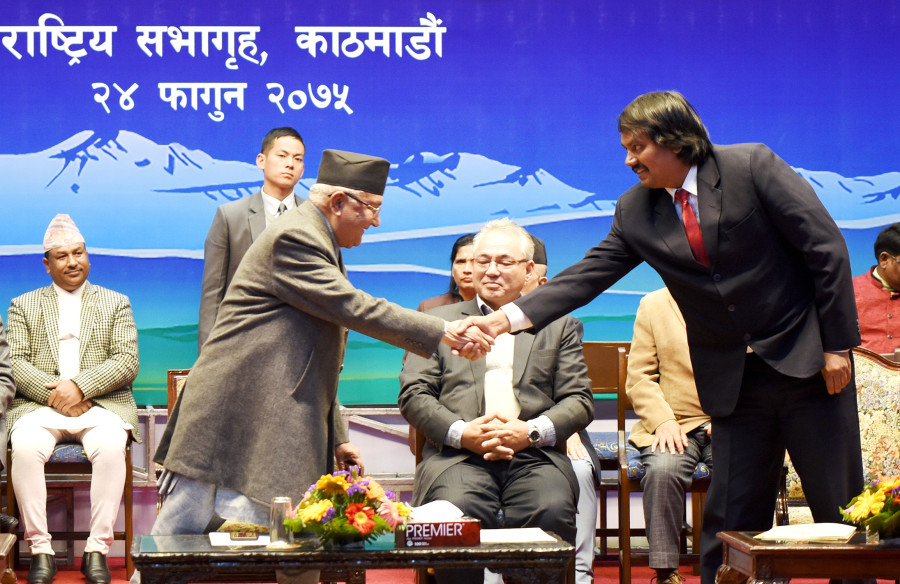National
CK Raut quits secessionist movement, joins mainstream politics
Free Madhes activist CK Raut, who had been demanding a separate Madhesi state for nearly a decade, reached an agreement with the KP Sharma Oli-led government on Friday, signalling his entry into mainstream politics.
Binod Ghimire
Free Madhes activist CK Raut, who had been demanding a separate Madhesi state for nearly a decade, reached an agreement with the KP Sharma Oli-led government on Friday, signalling his entry into mainstream politics.
Raut, in an 11-point agreement signed with the government at City Hall in Kathmandu on Friday, committed to honouring the “sovereignty”, “territorial integrity” and “dignity” of the country and vowed to abide by democratic norms in accordance with the constitution.
According to the agreement—signed on behalf of the government by Home Minister Ram Bahadur Thapa and Raut as central coordinator of the Alliance for Independent Madhes—the government will address the grievances of the Madhesi people, withdraw all cases against leaders of the Alliance and release them from custody without any preconditions.
The government also agreed to provide restitution to Madhesi activists and their families who suffered during various Madhes movements, including Ram Manohar Yadav, the Bardiya district coordinator of the Alliance who was killed in police custody in October last year, and provide employment to a member of his family.
The agreement, which came as a surprise to many, was signed within a day of Raut being released from judicial custody by the Supreme Court on Thursday evening.
However, sources close to Prime Minister Oli say Friday’s deal was the result of nearly two months of negotiation with Raut. Oli’s close aides were in constant touch with Raut, who was facing a jail term for “anti-national activities”.
“The PM himself put a lot of effort into the deal,” an advisor to Oli said on condition of anonymity as he was not allowed to speak to the media.
Jay Kant, Raut’s elder brother, echoed the advisor, saying they had been holding regular talks with the government’s representatives, and lately with Oli himself.
Raut was arrested on October 7 last year from the premises of the Rautahat District Court for an “offence against the state”, a decision that was upheld by the Birgunj bench of the Janakpur High Court in January this year. Issuing a ruling over a case filed by Raut challenging the decision of the High Court, the Supreme Court on Thursday ordered that Raut be released while asking the Rautahat District Court to continue an investigation.
“I am grateful to Prime Minister KP Sharma Oli for diligently and peacefully taking the initiative to safely land our movement,” Raut said after signing the deal. “The constitution provides sovereignty to the people, who will decide the future of the country.”
Raut, who had been denouncing the constitution ever since its promulgation in 2015, spent a significant amount of time praising the statute and Oli’s role in creating a platform for his “safe landing”.
“This is a victory for everyone. Now it’s time to move on the path of good governance, peace and prosperity,” Raut said.
Oli reciprocated Raut’s praise, comparing him to Pushpa Kamal Dahal, as a person with “exceptional decision-making ability”.
“In the past, it was Dahal who took a historic decision to give up the armed conflict to join mainstream politics. Now, that person is Raut. Such a step needs courage and vision,” Oli said. “He [Raut] is not just a technocrat but a thinker.”
Oli commended Raut for believing in the power of the people and the constitution, which “guarantees equal power and freedom to every citizen of the country”, he said.
Though Oli and Raut seemed to be on the same page, some differences over the interpretation of the agreement have surfaced between the two parties. Raut, in his address, didn’t clearly talk about referendum on the free Madhes issue but took to Facebook to claim that the government had agreed for a referendum.
Raut’s supporters say the second point of the agreement, which talks about taking the people’s mandate through a democratic process to address the grievances of some people from Tarai-Madhes, means holding the referendum. However, the aides to Oli don’t buy the agreement. “This is just a rumour. The agreement nowhere talks about referendum. Nor is it the spirit of the deal,” Kundan Aryal, press advisor to Oli, told the Post.
Analysts following Madhes politics say that the deal is a strategic move by both the government and Raut. The government wants political mileage by showcasing its ability to bring a secessionist force into mainstream politics while Raut, who was facing a jail term, wanted to be free to carry out his political activities, said Tula Narayan Shah, executive director of the Nepal Madhes Foundation. Shah called the deal “a calculated decision.”
Raut’s speech appeared to support the analysts’ contention, as he spoke at length on being imprisoned. “Though I was arrested and released dozens of times, spending five months behind bars made me realise how important freedom is,” he said.
Raut has adopted a political course similar to that of the Rastriya Janata Party-Nepal or the Madhesi Janadhikar Forum-Nepal, said Shah. Since people in the southern belt of the country are emotionally charged but not politically organised, Raut’s success in mainstream politics will depend on how well he can organise the people and set an example of good governance, Shah said. According to Jay Kant, Raut will form a mainstream political party and continue the fight for the Madhesi people.
Since 2006, Raut, an engineer by training, has been at the forefront of the movement for a ‘free Madhes’, arguing that only a ‘separate Madhes’ can liberate the Madhesi people. He formed the Alliance for Independent Madhes in 2011, which appealed for a stronger coalition to take the Madhes movement forward. Raut and his colleagues have since been arrested multiple times on sedition charges, but were released every time at the order of the Supreme Court.




 20.12°C Kathmandu
20.12°C Kathmandu














